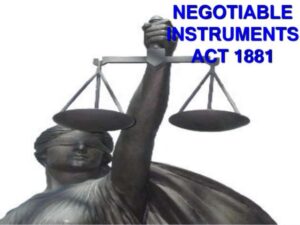

Section 11
A negotiable instrument is a signed paper that offers to pay someone or something else. Negotiable tools can be given to someone else, and the new owner can take the money as cash and use it however they choose. Checks, money orders, and promissory notes are all types of tradable assets.
Section 12
Any such instrument that isn’t drawn, made, or made payment in this way is considered to be a foreign instrument.
Section 17
Instruments that aren’t clear: If an instrument can be seen as either a promissory note or a bill of exchange, the holder can choose to treat it as either, and from then on, it will be treated as the one that was chosen.
Section 18
If the amount promised or told to be paid is written in words and numbers but not the same thing, the amount written in words is what is meant to be paid: That being said, if the words aren’t clear, the amount can be found by looking at the numbers.
Section 19
You can pay off a promissory note or bill of exchange whenever you want to.
(a) because it says so or because it’s due right away or when it’s presented; or
(b) if it doesn’t say when payment is due; or
(c) if the bill or note is accepted or signed after it’s due, as to the person signing or receiving it.
Section 20
The court looked at Section 20 of the Negotiable Instrument Act (NI Act), which says that if someone gives another person an unfinished negotiable instrument, the holder has the preliminary right to finish it for the amount that the writer agreed to pay.
- If someone signs and gives another person a piece of paper stamped according to the law on stamp duty that is chargeable on negotiable instruments, either completely blank or with the words “incomplete negotiable instrument” written on it so that it can be made or completed into a negotiable instrument, he basically gives the other person permission to make or complete the paper into a negotiable instrument for the amount.
- The person who signs the document is responsible for the amount written on it or filled in it, as long as subsection does not apply. This is because he or she signed the document in the position that it says they did.
It is agreed that the person signing the paper will not give anything more than the amount he plans to pay under it to anyone other than a holder in due time.
If you want to enforce the terms of such an instrument against someone who signed it before it was finished, you must fill it out within a fair amount of time and strictly follow the instructions given:
If such an instrument is signed and then given to a holder at the right time, it will be legal and effective for all purposes, and the holder can use it as if it had been filled out within an acceptable amount of time and strictly following the instructions given.
Section 42
Someone who accepts a bill of exchange with a fake name on it and makes it payable to the drawer’s order is still responsible to any holder who makes a claim based on an endorsement signed by the same hand as the drawer’s signature and appearing to be made by the drawer. This is true even though the fake name is fake.
Section 43
If a negotiable instrument is made, drawn, accepted, signed, or moved without payment or for payment that doesn’t go through, neither party is obligated to pay the other. But if that party gave the instrument to a holder for payment, with or without an endorsement, that holder and any other holders who got title from him can get the money that was owed on the instrument back from the person who gave it to them for payment or from any other party that was involved in the transaction.
Exception I: is that a person who paid for a negotiable instrument to be made, drawn, accepted, or signed cannot get that money back from someone who became a party to the instrument for his benefit after paying for it.
Exception II: No party to the instrument can get back more than the value of the consideration (if any) that he actually paid or performed. This includes parties who got other parties to make, draw, accept, endorse, or transfer the instrument to them for money that they didn’t pay or perform in full.
Section 104
Notifying of foreign bills 104. Foreign bills of exchange must be notifying for lack of honor when required by the law of the place where they were drawn.
Clause 134
Law governing responsibility of maker, receiver or indorser of foreign instrument. If there isn’t a contract saying otherwise, the person who made or drew a foreign promissory note, bill of exchange, or check is responsible according to the laws of the place where he made the document. The person who accepted or signed the document is responsible according to the laws of the place where it is payable. The Picture A made a bill of exchange in California, where interest rates are 25%, and B took it. It was due in Washington, where interest rates are 6%. The bill is signed in India and is not honored. A case is made against B in India based on the bill. There is only a 6% interest rate that he has to pay. If A is charged as the drawer, however, A has to pay a 25% interest rate.
Section 135
Some promissory notes, bills of exchange, and checks are payable in places other than where they were made or signed. The law of the place where they are payable decides what disgrace means and how much notice is enough.





